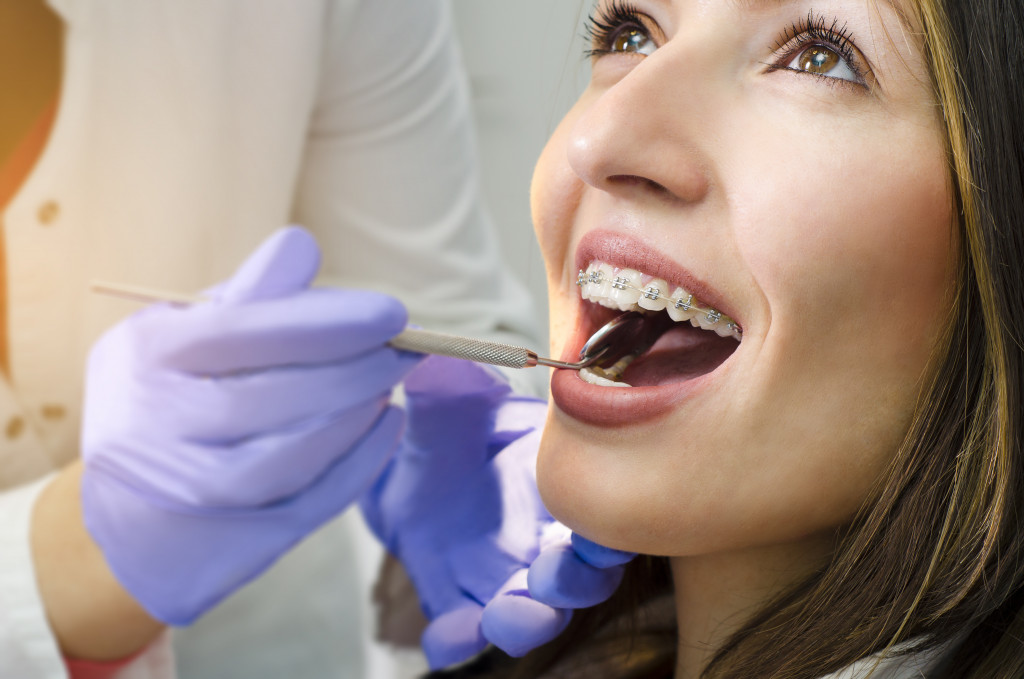- Consistent oral hygiene is crucial for good dental health.
- A healthy diet and regular dental check-ups are essential for proper dental health.
- Wear a mouthguard during physical activities to protect your teeth from injuries.
- Maintain and replace your mouthguard as needed to ensure optimal protection.
- Seek help from an orthodontic dental lab for specialized orthodontic appliances.
Maintaining proper dental health is essential for overall well-being. Your oral health affects your ability to eat and speak and plays a significant role in your self-confidence and overall health. To ensure a healthy smile, here are five tips to follow.
1. Practice Consistent Oral Hygiene
Consistent oral hygiene is the foundation of good dental health. Brush your teeth at least twice daily with fluoride and a soft-bristled brush. Take your time and brush all surfaces of your teeth, including the front, back, and chewing surfaces. Remember to brush your tongue to eliminate bacteria and keep your breath fresh.
In addition to brushing, floss daily to remove plaque and food particles between your teeth. Use dental floss or interdental brushes to clean these hard-to-reach areas. Regular use of mouthwash can also help kill bacteria and freshen your breath. Practicing consistent oral hygiene habits will reduce the risk of cavities, gum disease, and other dental issues.
2. Maintain a Healthy Diet

Your diet plays a significant role in your dental health. Avoid excessive consumption of sugary and acidic foods and beverages, as they can contribute to tooth decay and enamel erosion. Instead, choose a balanced diet of fruits, vegetables, lean proteins, and whole grains.
Calcium-rich foods such as dairy products, leafy greens, and almonds benefit your teeth as they help strengthen enamel. Drinking plenty of water throughout the day also helps wash away food particles and promote saliva production, which aids in protecting your teeth against decay.
3. Schedule Regular Dental Check-ups
Regular dental check-ups are crucial for maintaining proper dental health. Visit your dentist at least twice a year for routine cleanings and examinations. During your dental visits, your dentist will evaluate your oral health, perform teeth cleaning, and proactively identify any potential issues before they escalate into major concerns.
Regular dental check-ups allow your dentist to detect early signs of decay, gum disease, or other oral health issues. They can provide professional cleanings to remove plaque and tartar buildup that regular brushing and flossing may not eliminate. You’ll promptly stay on top of your oral health and address any concerns by scheduling regular dental visits.
4. Protect Your Teeth During Physical Activities
If you participate in physical activities or sports, protecting your teeth from potential injuries is essential.
Here are some tips on how to protect your teeth during physical activities:
Wear a Mouthguard
Mouthguards are an essential protective gear for those participating in physical activities or sports. They protect your teeth and reduce the risk of injuries to your tongue and lips. It’s important to wear a mouthguard when engaging in contact sports or any activity involving potential face impact.
Properly Maintain Your Mouthguard

It’s important to properly maintain your mouthguard to ensure it continues to offer the best protection. Rinse it with cool water after each use and brush it with a toothbrush and toothpaste at least once a week. Avoid using hot water, which can cause the mouthguard to lose shape. Store your mouthguard in a ventilated container when not in use, and regularly check for any signs of wear or tear.
Replace Your Mouthguard When Necessary
Mouthguards wear out and lose shape over time, especially if used frequently. They also may not fit properly anymore as your teeth change with age. It’s important to replace your mouthguard at least once a year or as your dentist advises. If you notice any signs of wear or tear, such as cracks or tears, it’s important to replace them immediately, as a damaged mouthguard can put your teeth at risk for injury.
Avoid Chewing on Hard Objects
Chewing on hard objects like pen caps or ice can not only damage your teeth but also cause damage to your mouthguard. If you have a habit of chewing on objects, remove your mouthguard before doing so. Also, avoid exposing your mouthguard to high temperatures, such as leaving it in direct sunlight or hot water. This can cause the material to warp and lose its protective properties.
5. Seek Assistance from an Orthodontic Dental Lab
If you require orthodontic treatment to correct misaligned teeth or improve your bite, seeking assistance from an orthodontic dental lab is essential. An orthodontic dental lab specializes in fabricating orthodontic appliances, such as braces or aligners, based on the treatment plan provided by your orthodontist.
Orthodontic dental labs work closely with orthodontists to ensure the precise creation and customization of orthodontic appliances. They use advanced techniques and materials to achieve optimal results. Collaborating with an orthodontic dental lab allows you to access high-quality orthodontic appliances that align with your treatment needs.
In Closing
Ensuring proper dental health requires practicing consistent oral hygiene, maintaining a healthy diet, scheduling regular dental check-ups, protecting your teeth during physical activities, and seeking assistance from an orthodontic dental lab when needed. By following these tips, you’ll be on your way to achieving and maintaining a healthy smile. Remember, consult your dentist for personalized advice and guidance regarding your dental needs.


